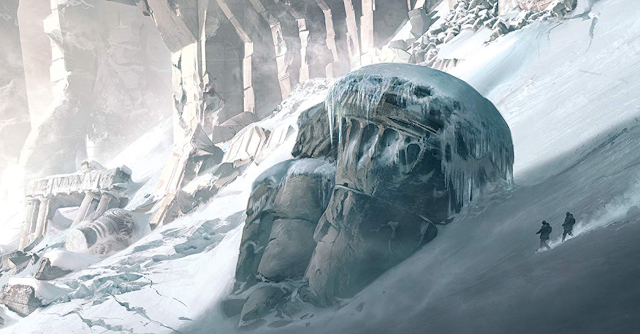At the Mountains of Madness
The highly acclaimed H.P. Lovecraft's "At the Mountains of Madness" sits at the intersection of modern horror and science fiction. Readers have to cast aside the straightforward plot and examine the thematic elements. Joyce Carol Oates, upon examining the thematic elements, reflected that there is "a grandeur--- a curious elegiac poetry of unspeakable loss, of adolescent despair and existential loneliness". Indeed, genre writers leave a gaping autonomy for the readers to explore motifs.
Lovecraft believes that fear is our deepest and strongest emotion, and cosmic horror is the grandest form of numinous fear. All Lovecraftian horror is based on the fundamental premise that common human laws and interests and emotions have no validity or significance in the vast cosmos at large. So, both the narrator and Danforth, in the face of pantheons of monstrous deities at large, can do nothing but run.
Lovecraft's descriptive genius is demonstrated in front-loading taxonomical identifiers--- it felt like overseeing the Cambrian explosion or Linnaean schema unfolding in these pages. It is a submission to the scientists' gaze: "Early in the boring the sandstone had given place to a vein of Comanchian limestone full of minute fossil cephalopods, corals, echini, and spirifera, and with occasional suggestions of ciliceous sponges and marine vertebrate bones." His heavy borrowing of Hellenistic mythology materializes in the use of tentacles, primarily in forms like Azathoth, YogSothoth, Nyarlathotep. Such a composition form emphasizes on the idea of primordial chaos, a social response to the inevitability of conflict in the wake of the Second World War.
Chaos is at the beginning of time.
Chaos is a constant state.
The Antarctic has long been connotated with the mythic landscape, the subject of the grand polar explorer's interest in the early 19th century. Landscape in literature is symbolic in psyche and culture like the moors of "Wuthering Heights", the crashing seas of "Moby-Dick", and the jungle in "Heart of Darkness". The Antarctic's role is to unravel an infinite bleakness to "scientific discovery" and "human progress", ending with all crew members either dead or driven insane.
I will now use my favorite scalpel to dissect H.P. Lovecraft. Lovecraft was an elitist, racist, critic of Hitler but adherent to the idea of racial hierarchy, and anti-Semite despite marrying a Jew. The Monster is an "Old One", by orders of chronology he proposes a biological hierarchy. China Mieville says that "Lovecraft has not so much the steady gaze of objective nihilism as the transmogrifying vision of hysterical nihilism, from which his racism is inextricable". The core science of "At the Mountains of Madness" is biology, but its political influences are extremely important. Paradoxically, Lovecraft saw the financial collapse of 1929 as "laissez-faire capitalism [being] at the end of its rope" and consequently became a patrician socialist while riding the elitist high horse. Lovecraft was heavily influenced by the idea that "High Cultures" pass through cyclic behaviors of birth, development, maturity, slow decline to senescence, decadence, and death. The Old Ones' city has a feature of unhuman gigantism, but all the while still became fallible to decadence.
The word, decadence, is mentioned 21 times in this novel.
The monster in "At the Mountains of Madness" represents the elite classes, while the Shoggoths are slaves to the Old Ones and bred to carry out labor. The Shoggoths revolt, which Lovecraft writes extensively about their inferiority and loathsome behavior--- because they are the masses. Lovecraft loathes Bolshevism: the masses are heterogenous and "shapeless congeries of protoplasmic bubbles". The Shoggoth is fashioned out of the distrust for the masses, the working class, eventually quelled to be repeating and mimicking the Old Ones. Therefore, Lovecraft operates on the sentiment that there is a visceral mistrust of and antipathy for the masses. He is merciless--- Shoggoths are described to be reproducing by fission and are dangerous upon acquiring accidental intelligence.
Acquiring accidental intelligence would be a perturbation in the system.
Perhaps the true horror that Lovecraft wishes to convey is that there is nothing more terrifying than an upheaval of the social order.




Comments
Post a Comment